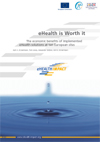 This study shows that across a wide range of eHealth applications clear evidence can be found of the benefits of information and communication technologies in routine healthcare settings.
This study shows that across a wide range of eHealth applications clear evidence can be found of the benefits of information and communication technologies in routine healthcare settings.
These benefits range from improvements in quality and better access of all citizens to care, to avoidance of unnecessary cost to the public purse.
This paper is part of a Study on the Economic Impact of eHealth (www.ehealth-impact.org) commissioned by the European Commission, Directorate General Information Society and Media, Brussels. This paper reflects solely the views of its authors. The European Community is not liable for any use that may be made of the information contained therein.
Executive Summary
The health systems of the European Union are a "fundamental part of Europe's social infrastructure". eHealth, defined in a holistic fashion as encompassing information and communication technology (ICT)- enabled solutions providing benefits to health, be it at the individual or at the societal level, is expected to contribute significantly to the further development of health systems. A key barrier to the more widespread diffusion of such solutions has been that little reliable evidence is available on the economic impact of using ICT in delivering high quality healthcare. The impact is potentially enormous, but has been difficult to measure, especially some of the benefits.
Evaluations often have only one perspective, such as financial, or the view of a single stakeholder.
The European eHealth IMPACT study, responding to the EU eHealth Action Plan (2004) target "to assess the quantitative, including economic, and qualitative impacts of eHealth" addressed these shortcomings by:
- Developing a generic, adaptable assessment and evaluation framework and method for eHealth applications and services, focusing on economic performance and measurement tools for quantitative indicators
- Identifying good practice examples of eHealth applications across European Union Member States and across the whole eHealth domain, integrating the experience and lessons learned from these examples into the method
- Applying the method and measurement tools at ten sites, each with proven eHealth applications and reflecting diversity of the regional and healthcare systems of the Union.
An online database of good practice examples in eHealth across Member States was also created as part of the project and is available at http://www.ehealth-impact.org
This report presents a synthesis of the outcomes of the study: Chapter 2 summarises the approach and methodology of economic evaluation and assessment developed by eHealth IMPACT. Next, the results from the economic evaluations performed are summarised, demonstrating the potential of eHealth to impact health services â both in economic and in qualitative terms. The third part, chapters 4 to 6, provides an analytical treatment of the results, including lessons learned and policy recommendations. Chapter 7 presents short summaries of the ten case studies and the results of each evaluation.
eHealth IMPACT developed a generic methodology for the economic evaluation of eHealth applications. It is a context adaptive model, so it fits a wide diversity of applications, from clinical settings to supply chain solutions. The model relies on the concept of cost-benefit analysis. Costs include the initial and continuous eHealth investments, such as those in ICT and change management, as well as the running costs of healthcare. Special attention has been paid to identifying the benefits to, and impact on, citizens. At the same time, benefits to all potential stakeholders can be analysed. The concept of cost-avoidance is important in identifying benefits. This is the cost for achieving the ICT-based performance without ICT, which is often prohibitive.
The results of the study show that given the right approach, context and implementation process, benefits from effective eHealth investment are indeed better quality and improved productivity, which in turn liberate capacity and enable greater access. Once development and implementation stages have been successfully realised, the value of these benefits, for what we have called a 'virtual health economy' consisting of the 10 evaluated cases, rises each year and exceeds the costs, usually very significantly. Annual costs are broadly stable once implementation has been completed, whereas net benefits tend to grow each year with expanding usage, showing that eHealth can contribute increasingly to satisfying citizens' needs and wants for healthcare.
For further information, please download: eHealth is Worth it - The economic benefits of implemented eHealth solutions at ten European sites (.pdf, 5,57 MB)